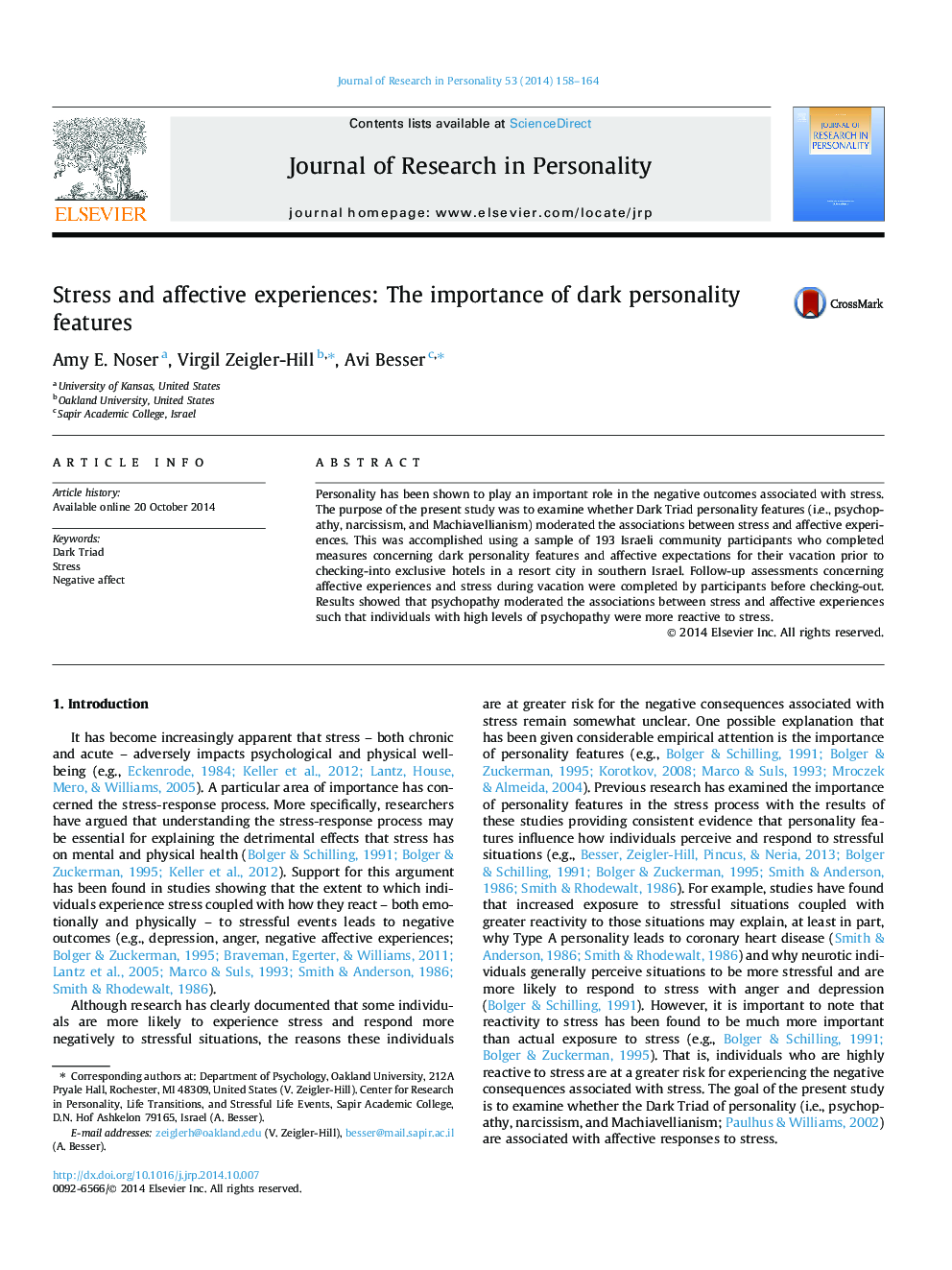| کد مقاله | کد نشریه | سال انتشار | مقاله انگلیسی | نسخه تمام متن |
|---|---|---|---|---|
| 7326945 | 1475945 | 2014 | 7 صفحه PDF | دانلود رایگان |
عنوان انگلیسی مقاله ISI
Stress and affective experiences: The importance of dark personality features
ترجمه فارسی عنوان
استرس و تجربیات عاطفی: اهمیت ویژگی های شخصیت تیره
دانلود مقاله + سفارش ترجمه
دانلود مقاله ISI انگلیسی
رایگان برای ایرانیان
کلمات کلیدی
سه تایی تاریک، فشار، تأثیر منفی،
ترجمه چکیده
نشان داده شده است که شخصیت نقش مهمی در نتایج منفی مرتبط با استرس دارد. هدف مطالعه حاضر بررسی اینکه آیا ویژگی های شخصیت تاریک (یعنی روانپریشی، نارسیسیسم و ماکیاولی) از ارتباط بین استرس و تجربیات عاطفی برخوردار بود. این کار با استفاده از یک نمونه از 193 شرکت کننده در جامعه اسرائیلی انجام شد که اقدامات مربوط به ویژگی های شخصیت تیره و انتظارات عاطفی برای تعطیلات خود را قبل از ورود به هتل های منحصر به فرد در یک شهر رفت و آمد مکرر در جنوب اسرائیل انجام داد. ارزیابی های پیگیری در مورد تجربیات عاطفی و استرس در طی تعطیلات، توسط شرکت کنندگان قبل از چک کردن انجام شد. نتایج نشان داد که روانپزشکی ارتباطات بین استرس و تجربیات عاطفی را تعدیل می کند به طوری که افراد با سطوح بالای روانپزشکی واکنش بیشتری نسبت به استرس دارند.
موضوعات مرتبط
علوم زیستی و بیوفناوری
علم عصب شناسی
علوم اعصاب رفتاری
چکیده انگلیسی
Personality has been shown to play an important role in the negative outcomes associated with stress. The purpose of the present study was to examine whether Dark Triad personality features (i.e., psychopathy, narcissism, and Machiavellianism) moderated the associations between stress and affective experiences. This was accomplished using a sample of 193 Israeli community participants who completed measures concerning dark personality features and affective expectations for their vacation prior to checking-into exclusive hotels in a resort city in southern Israel. Follow-up assessments concerning affective experiences and stress during vacation were completed by participants before checking-out. Results showed that psychopathy moderated the associations between stress and affective experiences such that individuals with high levels of psychopathy were more reactive to stress.
ناشر
Database: Elsevier - ScienceDirect (ساینس دایرکت)
Journal: Journal of Research in Personality - Volume 53, December 2014, Pages 158-164
Journal: Journal of Research in Personality - Volume 53, December 2014, Pages 158-164
نویسندگان
Amy E. Noser, Virgil Zeigler-Hill, Avi Besser,
